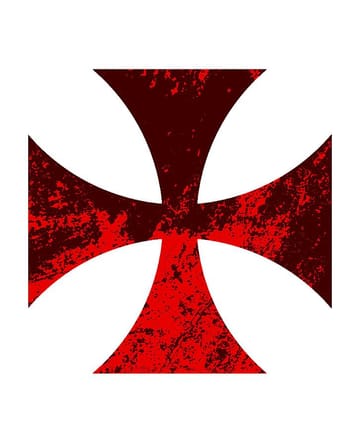The Crusades were a series of military conflicts between the Roman Catholic church and the Muslims. Not many of the Crusades led by the Pope were successful, but the Third Crusade was to a certain extent. [1] The Pope called the Third Crusade after Saladin captured Jerusalem.
The King of England, France, and the Holy Roman Emperor (German) answered the call to arms. The first army, the Germans, crossed the Hellespont into Anatolia (Turkey) and began with much success. However, Frederick Barbarossa, the great German Emperor, drowned while crossing the Saleph River, which took the momentum out of a force 100,000 strong. Germans had a great desire to fight for God, and Barbarossa's force showed the will of the Germans during the time to fight for their leader and the LORD's holy city. However, thanks to Barbarossa's death, the Germans lost momentum, and many of them returned home disheartened. Meanwhile, France and England crossed the Mediterranean and retook Acre. Acre was a significant port that could be used for the recapturing of Jerusalem.
The remaining Germans from Barbarossa's force joined them later. Nevertheless, thanks to quarreling with Leopold of Germany, who replaced the late Barbarossa, and problems back home in France with Phillip II, Richard of England was abandoned by both forces after the capture of Acre. This meant that Richard’s English was the main Crusader force. They had mercenaries with them; however, England’s small force was the main force that had to be used to defeat a much larger and more powerful Saladin.
Richard began his campaign by killing 2,700 Muslim prisoners in full view of the Muslim camp. As a result, the angered Muslims outrageously attacked but were easily driven back. Richard killed the prisoners because Saladin purposely held up negotiations for the surrender of Acre; Saladin’s intentions were never to release the Christian prisoners they had themselves. The Christians gladly killed the Turks, for the Turks were ruthlessly killing Christians during the long siege before Richard’s arrival.[2] After the exchange at Acre, Richard marched towards Jaffa. Again, along the way toward Jaffa, Saladin attacked him at Arsuf; however, Saladin was once more defeated.[3] Richard continued to capture Jaffa smoothly and set up an assault against Jerusalem after Arsuf. Regardless, King Richard knew that if he captured Jerusalem, he wouldn’t be able to hold it against Saladin’s much larger force and possible reinforcements from Egypt.
Therefore, he went back to Acre and expected to continue his standoff with Saladin. However, Saladin unexpectedly attacked Jaffa with a force of 7,000 cavalry and lost control of his army as they looted the city. As a chivalric man, Saladin informed the Christians that he had lost control of his army and told them to wait until he regained control before they could negotiate and remain in the citadel.[4] Richard, meanwhile, gathered a small force of men and sailed from Acre to Jaffa. When a priest spotted him, the priest leaped into the water and told Richard that the Crusaders were holding out in the citadel but that the city had been broken into. Upon hearing this, Richard immediately jumped out of the boat and swam to shore. Just 54 knights loyally followed him, yet he drove the Muslims back with pure bravery. Richards's victory was stunning to both Christians and Muslims, who saw his bravery.[5]2,000 Italian crossbowmen eventually supported him and stunned Saladin with yet another defeat.[6]
Both leaders, after the battle, fell ill from exhaustion, and Saladin sent fruits and mountain snow to speed Richard’s recovery.[7] Richard and Saladin would make peace and sign the Treaty of Jaffa afterward, and the Crusade ended without the capture of Jerusalem, but the result was positive, as they gained Acre and Jaffa. The English force was too small for the absolute defeat of the Muslims in Israel. However, Thanks to such amazing exchanges, Richard earned the nickname “Richard the Lionheart” or “Cour De Lion” as the Kings of England spoke French during this time.[8] Richard the Lionheart is one of world history's most intimidating and respectable characters. He was a devoted Christian warrior and wanted Jerusalem for the sake of God. His heart was with God, and he saw Jerusalem as his destiny. Sadly, later, Richard Lionheart would die during an unimportant siege of a small French Castle. Despite his demise, his legacy is still great. The Battle of Jaffa is one the most legendary battles of the Crusade and led to the preservation of the Crusader States in Israel for many more decades. The Battle of Jaffa is a great example of a true legend.
[1] Charles Phillips, An Illustrated History of Crusades and the Crusaders Knight, (Lanham: Lorenz Books, 2009), 138.
[2] Helen J. Nicholson, The Chronicle of the Third Crusade, (Burlington: Ashgate Books, 1997), 231.
[3] Ibid.
[4] Ibid.
[5] Margaret Ruth, The Chronicle of Ernul and the Continuations of William of Tyre, (Baltimore: Morgan Books, 1973 ), 74.
[6] Ibid.
[7] Ibid.
[8] Ibid.


